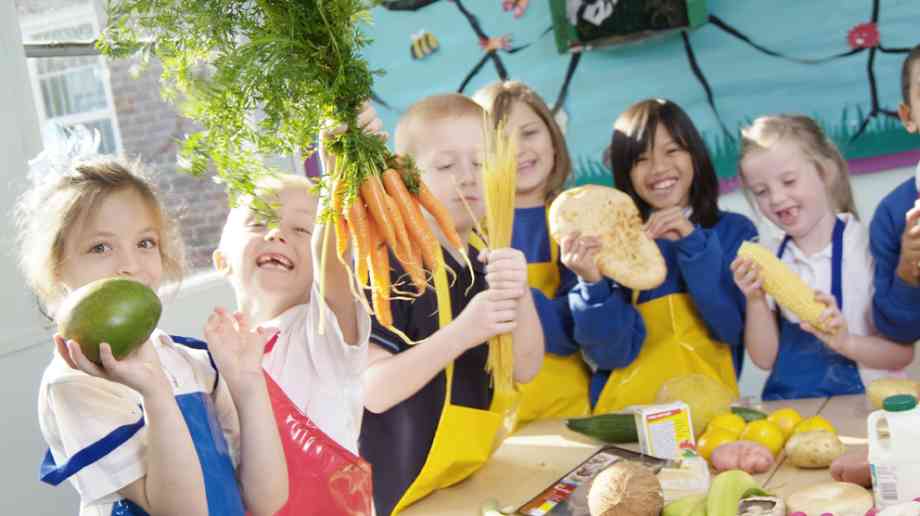
Clearing the confusion about healthy eating
There is widespread confusion among children and adults about which foods do and do not count towards your 5-a-day or provide certain nutrients, according to a survey by the British Nutrition Foundation, released during Healthy Eating Week
During this year’s Healthy Eating Week, which took place 13-17 June 2022, the British Nutrition Foundation revealed survey findings that showed widespread confusion among people of all ages, including adults and children, about which foods do and do not count towards your 5-a-day or provide certain nutrients, including fibre and protein.
The survey suggests that nearly a quarter (24 per cent) of primary school children (aged 7-11 years) and 17 per cent of older children (11-16 years) think that chicken counts towards your 5-a-day, while nearly a fifth (19 percent) of primary school children think that cheese can be one of your 5-a-day.
Only 38 per cent of all British adults and 23 percent of older children know that carrots contain fibre, while only 60 per cent of secondary school children and 36 per cent of primary school children believe that wholemeal bread is a source of fibre. Nearly a quarter (24 per cent) of all school children think that chicken is a source of fibre, although it provides no fibre at all.
Seventy-nine per cent of adults, 91 percent of secondary school children and 70 per cent of primary school children correctly say that chicken provides protein but only half of all adults, 46 per cent of older children and 29 percent of younger children think that chickpeas are a source of protein. This is despite the fact that canned chickpeas are a rich source of protein, with an average adult portion providing around a fifth of the average adult’s recommended intake per day (45g for females and 56g for males).
The survey also shows that many people do not currently eat, or have never tried, a range of plant foods, such as beans, peas and lentils, which provide essential nutrients like protein and fibre. One third of adults and more than half (55 percent) of schoolchildren reported that they have never tried lentils, one third of adults and 46 percent of schoolchildren have never tried chickpeas and over a quarter (28 percent) of adults and 48 percent of children have never tried kidney beans.
Sara Stanner, science director at British Nutrition Foundation comments: “Government advice is for us all to eat more plant-based foods because they’re good for us and for the environment. It is concerning that there is confusion across the UK about the nutritional contents of some common foods, including plant-based foods. Lack of knowledge means people are less empowered to make informed choices, and achieving a healthy diet, with a good balance of the right types of foods, is more difficult if you don’t know which key nutrients the foods that we eat provide.”
Food waste
The survey findings also reveal a mixed picture when it comes to how people most commonly manage their food waste. A quarter of all adults say that they put their food waste in the general waste bin, with only 17 per cent using a compost bin, and 27 percent freezing left over food to eat at a later date. Nearly a third (32 per cent) of adults say that they use ‘what they can’ of unused foods, cutting off mouldy bits and eating the remainder, while 30 per cent say that they look for a recipe to help use leftovers up.
Sara Stanner continues: “From varying our protein sources, to increasing our fibre intake, to reducing food waste, there’s a wide range of ways people in the UK can adjust their eating habits for the benefit of themselves and the planet. But why is healthy eating so important?
“If we think about fibre, eating plenty as part of a healthy, balanced diet is linked to a lower risk of heart disease, stroke, type 2 diabetes, and bowel cancer, and choosing fibre-rich foods may also help you to feel fuller for longer, which can help support weight management. Most people in the UK do not get enough fibre - adults are recommended to have 30g of fibre each day, but we are currently only eating 19.7g on average.
“Pulses, such as chickpeas, kidney beans and lentils, are all great sources of fibre and provide protein. They also have a low environmental impact and are relatively cheap to buy and cook. One portion of pulses even counts towards your 5-a-day, yet their nutritional value is often underestimated and many people do not even think to eat them. This Healthy Eating Week, participants got involved in our challenges, learn something new about healthier and more sustainable eating and develop new ways to improve their diets.”
Healthy Eating Week
Over the last decade, Healthy Eating Week has been instrumental in helping to educate and inspire young people to lead healthier lives by providing early years settings, primary and secondary schools with a wide range of free resources and activities based on five daily themes that can be practised anywhere.
Over 1.8 million adults and children from across the country participated in Healthy Eating Week this year, undertaking a series of daily challenges linked to the theme ‘Eat well for you and the planet’, aimed at raising awareness about healthier and more sustainable diets and empowering people to make positive changes.
The challenges included focusing on fibre for meals and snacks, getting 5-a-day, staying hydrated, varying protein and reducing food waste by knowing the correct portion sizes.
Healthy Eating Week takes place once a year, normally in June. By signing up for Healthy Eating Week, schools join thousands of others communicating the value and importance of healthy eating and sustainable lifestyles, while gaining access to a wealth of free resources, including age appropriate activity packs, posters, health trackers, recipes and certificates. Resources are tailored for early years settings, primary schools and secondary schools to provide teachers with the opportunity and resources for teaching their pupils about healthier and more sustainable diets
Schools are also encouraged to engage their catering teams in the Healthy Eating Week activities taking place and to share the resources provided, helping to ensure the lessons and learnings from the Week can be practised throughout the full school year.
Additionally, Healthy Eating Week also aims to get parents involved through discussions with their children around developing healthier and more sustainable diets in practical ways such as substituting healthy snack choices in children’s lunchboxes and putting lessons learned into practice with their children in the kitchen at home.
Latest News
31/10/2025 - 10:12
A growing number of UK children are now eligible for Free School Meals (FSM), yet most still aren’t taking advantage of them on a daily basis, new research reveals.
30/10/2025 - 01:28
In the wake of the Raac crisis, the DfE spent £5 million on research into the condition of school buildings, which is due to conclude in spring 2026.
30/10/2025 - 01:09
Malmesbury Primary School in Wiltshire has submitted plans for a major expansion, funded by entrepreneur James Dyson.
30/10/2025 - 00:55
Monday's Every Pair Tells a Story campaign to protest to highlight the national crisis in SEND provision.
29/10/2025 - 09:19
Estimated data from the Department for Education reveals that 470,000 pupils under 16s use local authority funded transport to get to school.







